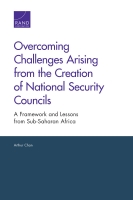by Arthur Chan
Research Questions
How can these challenges be overcome?
How can a framework of an effective NSC be created?
In reviewing the case study countries, what is the security and political situation of country leading up to the establishment of its NSC? What are the NSC's institutional features? How does the NSC rate against the framework?
How can Mali apply these lessons to create its own NSC?
How can Mali overcome potential challenges in establishing its own NSC?
This report examines and explores what potential challenges arise as a result of setting up a national security council (NSC) and what the most effective means are for overcoming these challenges. It should be of use as a reference to the government of Mali as it considers establishing such a body for itself. Through a review of open source literature and interviews with subject matter experts, the author creates a theoretical framework by which to measure the effectiveness of NSCs in terms of overcoming these potential challenges. The author then applies this framework to three case studies: Sierra Leone, Côte d'Ivoire, and Mozambique. The author finds that the features that allow an NSC to most effectively overcome potential challenges include (1) having legally defined roles and authority and the backing of the country's chief executive; (2) being predominantly civilian in membership but with relevant noncivilian input, a relatively compact size, and meaningful accountability; and (3) having adequate resources to support its work, whether in terms of funding, personnel, or expertise. Although an NSC may be effective at overcoming these potential challenges and ultimately may be a well-functioning body, this is not a cure-all for challenges in the broader security environment, such as ensuring stability or effective implementation of security sector reforms. Other factors, such as the state of the economy and the status of former combatants, will also have a major impact on these broader challenges. Therefore, a government should construct an effective, well-functioning NSC in conjunction with reforms elsewhere.
Key Findings
Questions about the NSC's roles and authority must be answered
Is there a legislative or constitutional basis for the NSC?
Does the NSC have the backing of the country's chief executive?
The composition and accountability format of the NSC must be examined
Is there a balance between civilian and noncivilian members of the NSC?
Is the NSC appropriately sized, with virtually all NSC members having national security responsibilities?
Is there meaningful accountability for the NSC?
The sufficiency of resources for the NSC must be assessed
Do the NSC and its secretariat have appropriate levels of personnel and funding?
Does the NSC have access to a broad range of expertise?
Recommendations
The NSC should be established through law. The law schould specify the composition, authorities, sources of funding, and other modalities of the NSC are.
Because of the importance of the NSC and the issues it handles, both the president and the prime minister should be statutory members of the NSC, with the former serving as its chair.
The NSC should include a balance of civilian and noncivilian members, although it should be slightly tipped in favor of civilians.
Core members of the NSC should include the ministers for defense, foreign affairs, justice, etc. Military and intelligence chiefs could also serve as advisers. Officials who do not have duties directly related to national security should be invited to attend only when necessary.
The national security adviser should be appointed only on parliamentary approval.
The NSC should present periodic reports on its activities to parliament.
The NSC should consult parliament on major issues, such as domestic deployment of the armed forces.
The NSC should include representatives from other political parties.
The NSC and its secretariat should have funding streams ensured by legislation and have a formal process for recruiting staff members.
The NSC and its secretariat should work with other institutions to share the resources and burdens; draw on expertise across other national agencies or across different levels of government; and draw on outside expertise, such as academia and the private sector.

No comments:
Post a Comment